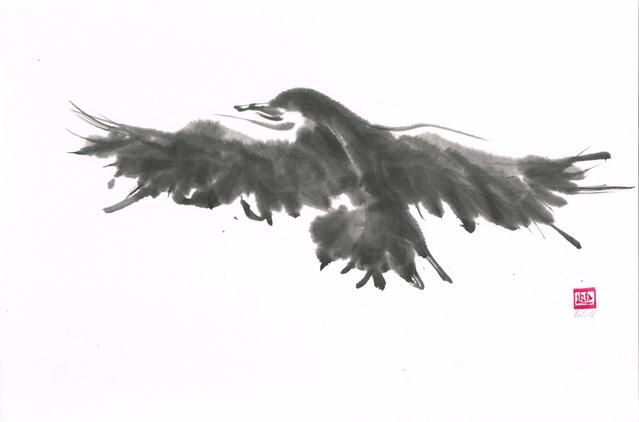Verse 18*
There is benevolence and justice
Intelligence comes forth
There is great deception
There is filial piety and kind affection
The country is in confused chaos
There are loyal ministers
Us artists are lucky, because if/when we let go of thoughts, trust the process of creating, we find ourselves often in this space. But when the “Intelligence comes forth” , when the judgement and comparing comes into the picture, when one creates for an agenda, purpose, then art becomes a pretence and insincere. Even if used with best intention, decisions made by logic only, don’t serve us always well.
When the relationships among artists and with the public is on genuine and forthright basis, everything happens harmoniously….nothing to push for, no control…
Lao Tzu even then has been noticing how it’s easy to forget, deviate from “The great Tao”. I must say that for me I find it difficult to live always the Natural way. This is the reason I have taken this practice of interpreting the Tao Te Ching, to use it as a reminder to come back and act from my senses, behave, teach and create from my heart….with love…in harmony with Tao…a challenge but very rewarding!
Your thoughts on this is extremely valued, as sometimes I wonder about the applicability of Lao Tzu’s wisdom in modern world.
*Translation by Derek Lin


Oh yes! Well put, you got it! It is to connect and show that connection through the work….without words or explanation.
But with your approach, you begin with an object, a subject. Why do you not begin with "nothing"? Wouldn't that make taking words out of the process easier? Or is your purpose to connect, not disconnect?
Do you mean painting without purpose and agenda? There is a certain philosophy in creating/living with Eastern outlook. There is nothing wrong in the Western approach, but sometimes in pursuit if the message the artist loses the spontaneity, the natural (Tao) way. I find, bringing in the Eastern perspective can create a better balance between logic and spirit (Yin and Yang)
Thank you again for your insightful comment/input. This verse does have a lot depth to unpack. Again, the point of my blog is not an in depth literary or philosophical dissertation of the Tao Te Ching, which is obviously your expertise. I try to leave room for the viewer/reader to experience things personally and thus make it their own, a philosophy I also apply to my art. I am inspired by the verses and write about specific themes here as they arise through my specific artist's lens.
How do you think this relates to Western abstract art? Many artist's begin with nothing in mind, letting the paint take them where it may. They lose themselves in this process, which sounds like what you do also, trying to take words, and imagery, out of the equation.
This caught my eye, "When the relationships among artists and with the public is on genuine and forthright basis, everything happens harmoniously….nothing to push for, no control"
This line (Line 3) of chapter 18 can be a bit inscrutable. It goes against some 'fundamental absolutes' human cultures hold dear. Derek Lin translated the 4 lines of this chapter into 8 somewhat disconnected lines, which may further blur the linkage the original characters convey.
The nearly literal reading goes like this:
When the great way is abandoned, there exists benevolent justice.
When intelligence increases, there exists great falseness.
When relationships lack coherence, there exists respectful kindness.
When the country is confused and chaotic, there exist loyal officials.
Chapter 18 offers insight into the how and why we do what we do, especially if I view it from a symptoms-point-of-view. Seen this way, the respectful kindness we engage in is how we compensate for the lack of coherence we experience in collective extemporaneous awareness. That lack of coherence is due to our mind's thinking-it-knows-disease mentioned in chapter 71.
The second line simply offers a more honest picture of the flattering labels we give ourselves. The scientific one being Homo sapiens, where sapiens means: discerning, wise, judicious, discreet. Aren't these labels and intelligence rather synonymous?
The first line may be the most challenging of all. When I observe nature in the wild, I see no 'benevolent justice'. That makes 'benevolent justice' simply another comforting paradigm essential to keep civilization from collapsing from its own weight. 😉
http://www.centertao.org/tao-te-ching/carl/chapter-18/